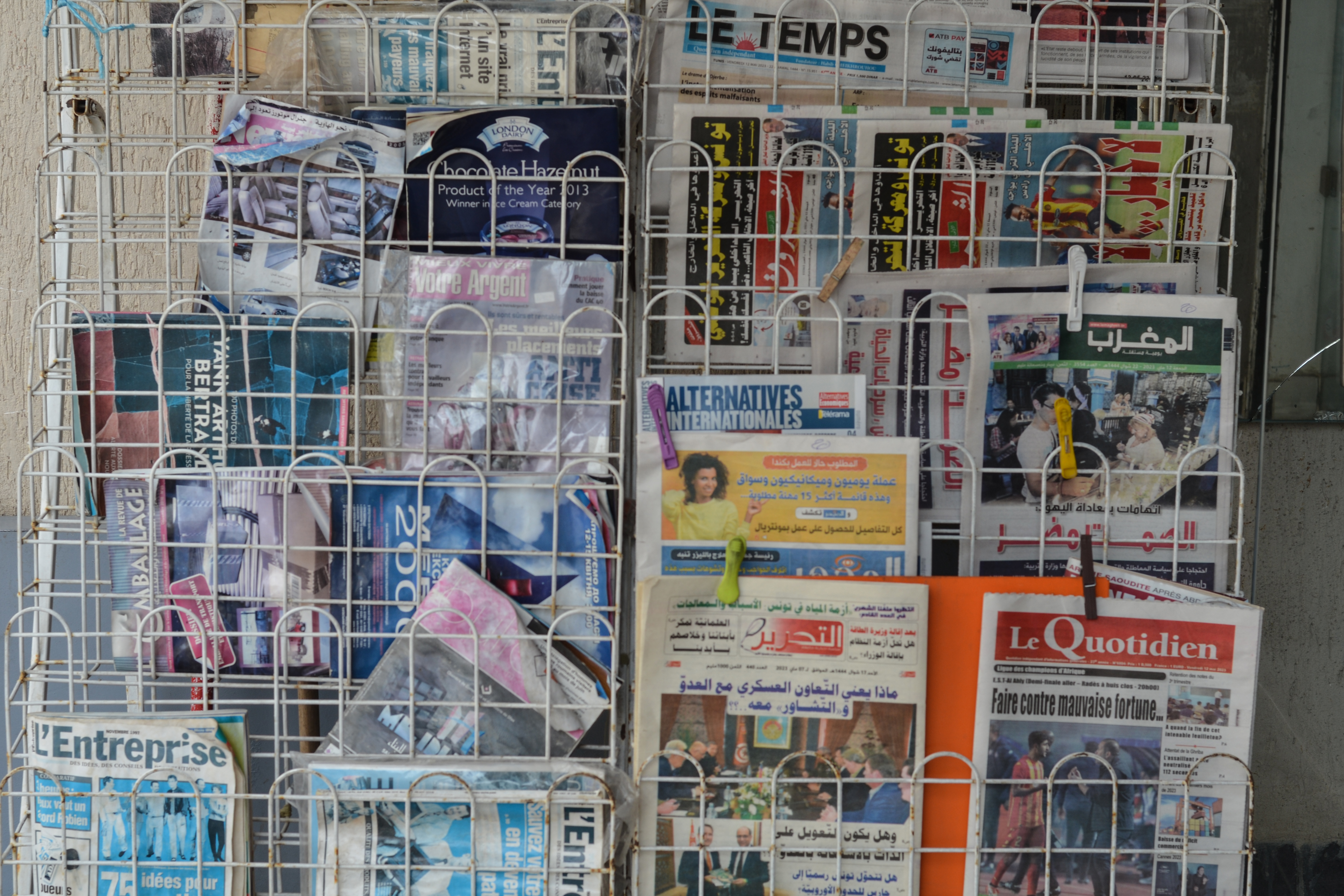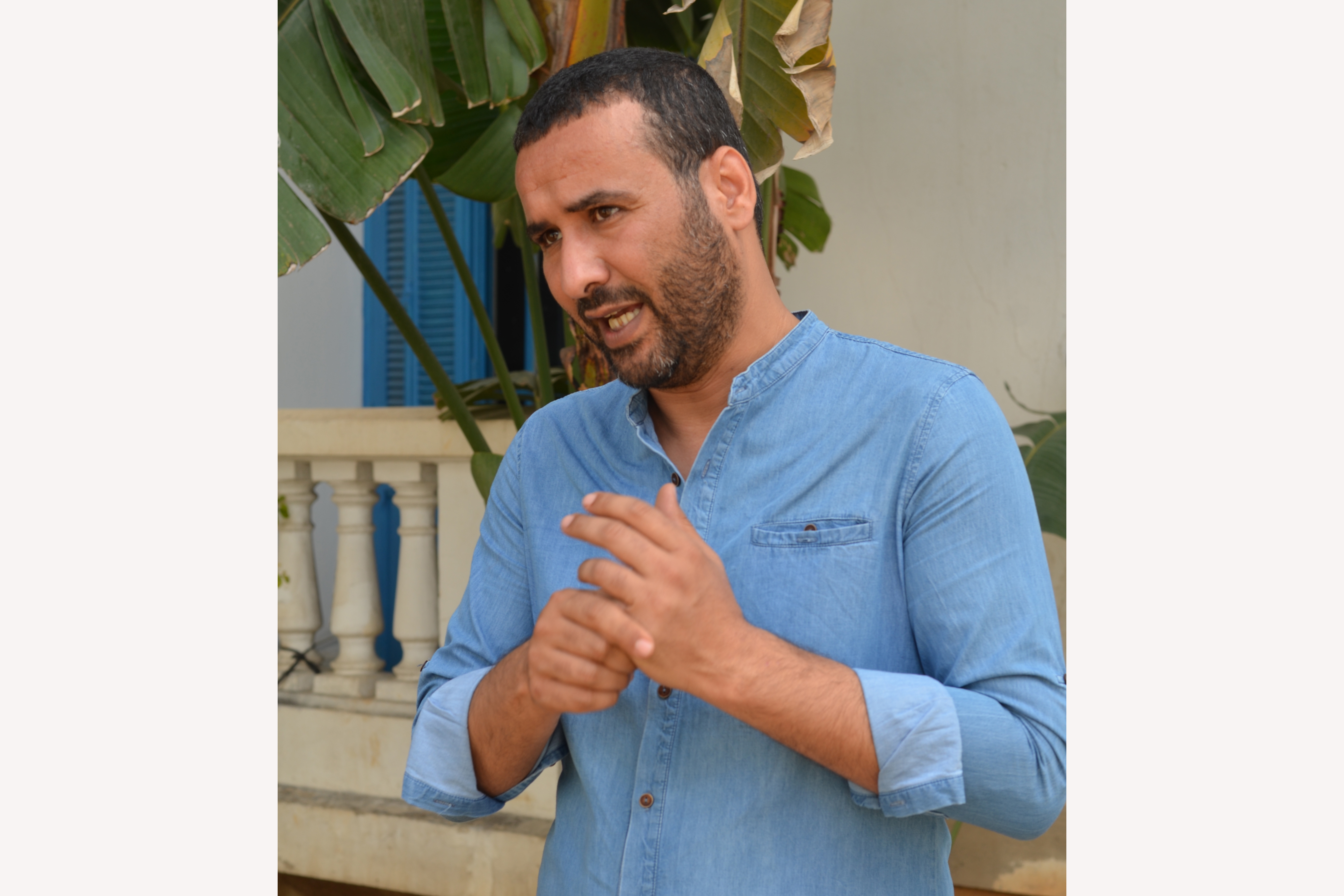
Tunis, Tunisia – The back room in the restaurant near Mosaique FM Tunis’s offices is deserted. In a corner, Tunisian political commentator Haythem El Mekki speaks as he eats. Between mouthfuls, he lists the litany of threats and abuse he has received since the country’s 2011 revolution.
“I’ve been targeted on a daily basis and on a massive level since the revolution,” he says. “I’ve been threatened physically dozens of times,” he adds, before describing the two distinct assassination threats from hardline groups that required police intervention. He pauses, thinking: “They’ve also sent ricin [a poison] to the radio station where I was working.”
Nevertheless, despite his brushes with everyone from religious hardliners to the pre-revolutionary regime of Zine El Abidine Ben Ali, it is the passage of Article 54 – punishing anything online that the government decrees “fake news” and coming with the cultural about-face across much of Tunisia’s national media in the last two years – that has left El Mekki and others like him isolated and closer to arrest than ever.
Journalist Nizar Bahloul, the editor of the online title Business News, has already been charged under Article 54 for a column pointing out the absence of any achievement by the country’s head of government (prime minister) in 13 months in office.

Ahmed Bahaa El-Din Hamada, a university student, was held under the terms of the article for posting on social media about a protest in his neighbourhood. Lawyers, former politicians and previous members of the electoral commission have all been prosecuted under Article 54, labelled by Amnesty International as “draconian“.
“The main problem is not the article itself, it’s in its application,” El Mekki explains. “When you see the editor of Business News prosecuted for something he published, you’re left thinking, what next? The law itself is about tackling ‘fake news’ on the internet, but the Business News piece wasn’t fake news, it was just opinion. Others talk about abuses committed by a minister, and they’re also prosecuted. It’s clear that this wasn’t written to combat fake news. It’s there to shut the mouths of journalists who are critical of the system. That’s all.”
Allied to legal penalties for publishing supposed falsehoods online has been the cultural change that took place across much of Tunisia’s mainstream media since President Kais Saied’s dramatic power grab in July 2021.
In recent months, an explicit supporter of former President Zine El Abidine Ben Ali has been appointed to head the country’s news agency, Tunis Afrique Presse (TAP), with a corresponding shift in output. La Presse, the country’s state newspaper, recently led with the headline Merci Monsieur Presidente (“thank you sir president”), while the national television channel has been dismissed by the National Syndicate of Tunisian Journalists (SNJT) as a “trivial propaganda mouthpiece that excludes all opposition voices”.
Lauded, often overseas, as one of the great gains of the revolution, media freedom in Tunisia has often been shaky. Insulting public officials or state institutions, such as the army, has long been punishable by military courts.
However, the president’s current authoritarian turn, including the purging of his opponents and critics, as well as his curtailing of media freedoms, has rarely appeared more ominous.
In early May, Reporters Without Borders, also known under its French name Reporters Sans Frontières (RSF), published its latest global ranking in media freedoms, showing a dramatic fall for Tunisia, from 94th – already fairly low down – to 121st place out of the 180 countries surveyed.
“Tunisia has fallen in this ranking for several reasons,” said Khaled Drareni, RSF’s North African representative, outlining the country’s political environment, including the purges of the president’s opponents and his distinct authoritarian turn.
However, it was Article 54 that proved to be among the most significant. “While the decree-law sets out penalties,” Drareni said, “it does not provide any definition of ‘fake news’ and ‘rumour’.” In this way, the government allows itself the pretext for using the fight against fake news, to “legitimise attacks on press freedom and the right to inform and be informed”, he said.
Flashes of hope
The landscape is not entirely bleak. Independent radio, including outlets such as Mosaique FM, where El Mekki works, and titles like Nawaat and Inkyfada, still produce responsible journalism.

A protest, in response to the violence triggered by the president’s racist characterisation of the country’s undocumented Black refugees and migrants, was organised for the most part by journalists, outside the Tunis offices of the SNJT.
“We get abused, People insult us online. Mostly you get used to it,” said Mohamed Mehdi Jlassi, the president of the SNJT.
“However, before Article 54 there were laws protecting the rights of journalists to write what they have seen and what they know,” he said through a translator.
“There was always bullying, I’m not saying it was great, but there were laws. Article 54 changed everything. There are now 17 journalists being prosecuted under the terms of this law. It isn’t just journalists. There are actors, politicians and activists, all of civil society faces legal issues.”
Control over Tunisia’s media has real-term consequences. While President Saied’s populist programme and the purges of his already widely resented opponents in the former parliament and their supporters play to an appreciative audience, the absence of any critical examination cannot be overlooked.

In the face of Saied’s dismissal of the “diktats” forced upon the country in return for a much-needed bailout from the International Monetary Fund, he has yet to be pressed on an alternative. Similarly, the plethora of charges arrayed against his opponents and critics, many for “plotting against the state”, have yet to be publicly examined.
Claims by the Foreign Ministry that it is impossible for Tunisia to be racist have yet to be measured against the president’s words and, in February, before the current round of arrests, the president scored overwhelmingly in polls carried out by the country’s two leading polling companies.
Back in the cafe, El Mekki knows his reputation offers a degree of protection. But things are changing. The arrest of Mosaique FM’s Director-General Noureddine Boutar on money-laundering charges, plus the recent arrest of the leader of the self-styled “Muslim Democrats” party Ennahda, Rached Ghannouchi, who was charged with plotting against state security, all point to darkening skies.
“Everyone thought Ghannouchi was internationally protected somehow,” El Mekki said. “But they arrested him anyway. If they can do that, then why not, why not me next? I’m one word away from it.”







